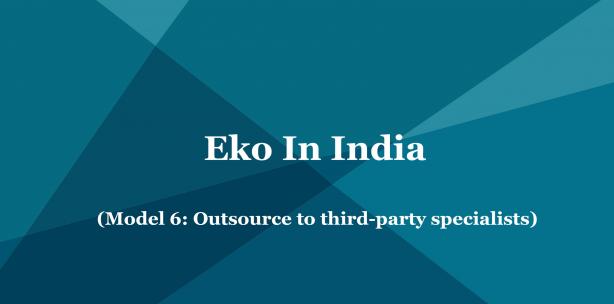
Eko is a Business Correspondent (India’s term for banking agent) serving the State Bank of India (SBI), ICICI Bank and Yes Bank. The Reserve Bank of India (RBI) only allows banks to have exclusive agents. Therefore, while Eko now has partnerships with multiple banks, each agent outlet may only offer services for a single bank. This means that Eko is effectively running multiple agent networks in tandem and therefore providing a third-party specialist model for banks.
Eko is still a small agent network manager, operating in only two regions of India, each of which it subdivides into five areas. It covers a total of ten states. Each region has a head, and each area has a manager, and through this small hierarchy, they manage about 3,000 agents. Eko selected a master agent model to build its network, recruiting small Fast Moving Consumer Goods (FMCG) distributors and stockists. At first, it focused on recruiting airtime distributors to become master agents by converting the retailers they managed into agents. However, that proved difficult, as the commissions were not competitive compared to airtime sales; retailers did not have enough liquidity; and prospective agents were worried that digital finance might displace their airtime voucher business.
So Eko expanded its search for master agents, focusing on registered businesses which were distributors for around 300-500 shops and usually worked for an FMCG company like Unilever, so they had healthy cash flows and strong management teams. While Eko requires that they agree to operate exclusively with Eko, the larger distributors, who serve 5,000 or more retailers, can choose to become Franchisees. This means they can earn twice the 10-15% margin on commissions that master agents earn. However they are expected to manage their agents more independently than the master agents.
The partner bank is ultimately responsible for the compliance of the agent. It also sets the prices of the services offered. It may provide support in the form of marketing materials, and in most cases it plays a crucial role in product development. However, beyond this, Eko manages the strategic operations of the agent network. Eko designs specific selection criteria based on its partner bank’s goals, and the master agents have to recruit agents who meet those metrics, and propose them to Eko. After they are vetted, Eko waits until there are 15-20 new agents and then trains them all as a group.
Once agents start operations, they are visited by both Eko and master agent staff. Eko area managers visit agents at least once a month to monitor their operations and provide support. The area managers use dashboards to monitor agent liquidity multiple times a day from the head office. The master agents must open accounts in Eko’s partner banks, and schedule visits least once a day to help agents rebalance. They also have access to web portals which display their agents’ float levels to help them predict shortages.
However, these distributor partnerships have not yielded the geographical coverage that Eko desires, and therefore it uses a centralized channel build to augment its agent network in particular cases. Eko covers specific geographical areas for individual banks, and also tries to cover domestic remittance corridors where banks need to place agents in locations frequented by migrants. Furthermore, Eko has started partnering with NGOs and MFIs to recruit agents in rural areas beyond the reach of the FMCG networks. Eko has also developed an online portal where prospective agents can apply and submit their documentation remotely.
Eko also recruits directly to complement the demographics of their agent network. For example they might specifically target chemists (pharmacists) as they have experience of explaining complicated products to their customers, and are therefore well suited for customer enrolment. Agents who are recruited directly are expected to operate independently as far as possible, and rebalance their own float without the support of a master agent. Eko’s aim is to grow and evolve its network so that its agents manage themselves while providing Eko with the scale, reach, and quality of service that it desires.





